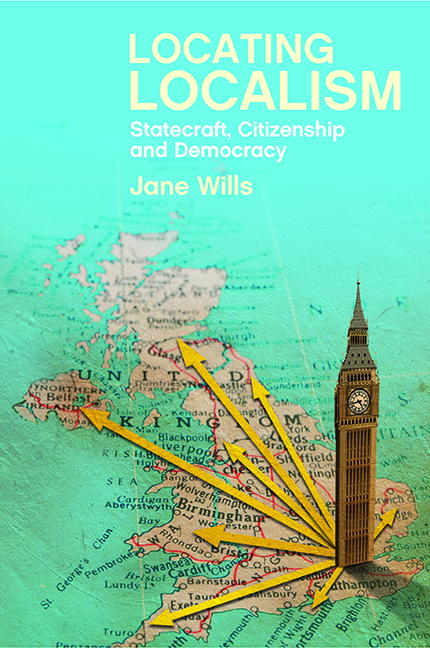Book contents
- Frontmatter
- Dedication
- Contents
- List of figures and tables
- Acknowledgements
- Introduction: the argument being made in this book
- one Making sense of localism
- two The geo-constitution and the long history of localism
- three The place of the people
- four Localist local government
- five Institution building for localist futures
- six Community organising: past, present and future
- seven A localist future?
- Appendix: Research design and methods
- References
- Index
three - The place of the people
Published online by Cambridge University Press: 05 April 2022
- Frontmatter
- Dedication
- Contents
- List of figures and tables
- Acknowledgements
- Introduction: the argument being made in this book
- one Making sense of localism
- two The geo-constitution and the long history of localism
- three The place of the people
- four Localist local government
- five Institution building for localist futures
- six Community organising: past, present and future
- seven A localist future?
- Appendix: Research design and methods
- References
- Index
Summary
The history of the development of the British state has understandably left its mark on forms of citizenship and our expectations about democratic engagement (Almond and Verba, 1963; Whiteley, 2012). As outlined in the previous chapter, the legacy of centralisation has reduced the salience of local government and limited the incentive for popular engagement at the local scale. Centralisation has also meant that government can seem very remote: not only are local authority areas often very large, with key decisions being taken a long way away in the county or metropolitan centre, but the most important decisions are taken even further away, in the Parliament in Westminster. Although citizens are represented by local councillors and Members of Parliament, personal interaction is only likely in order to ask for help, to protest about something or to secure votes in the run-up to an election; there is little call to contribute on a more ongoing and positive basis.
This chapter further explores the implications of the prevailing geographical division of political power in England, and it moves on to look at questions of political practice. As suggested in Chapter One, localism is, in part, a ‘top-down’ response to a variety of concerns including the need to save money, a desire for more appropriate decision making and a perceived gap between the political elite and the people (Flinders, 2012; Mair, 2013; Chwalisz, 2015; Parker, 2015). In this regard, it is a contemporary manifestation of long-standing efforts to foster active citizenship, and there are important questions about the extent to which this will be a success.
As outlined in the previous chapter, the administration of local and national government always depended on an active minority taking up the cudgels of government in a voluntary role. Before the advent of the mass franchise, this expectation was placed upon the wealthier members of society who could afford to adopt the sentiment of noblesse oblige that was associated with the duties of wealth (Dorey and Garnett, 2012). In the era of the mass franchise, however, this tradition of political service was slowly reformed. The old formulation that political representation and activity were associated with status and wealth was re-imagined through the twin processes of democratisation and professionalisation. After 1911, Members of Parliament were paid and the job was increasingly seen as full time (Pelling, 1967).
- Type
- Chapter
- Information
- Locating LocalismStatecraft, Citizenship and Democracy, pp. 79 - 112Publisher: Bristol University PressPrint publication year: 2016



